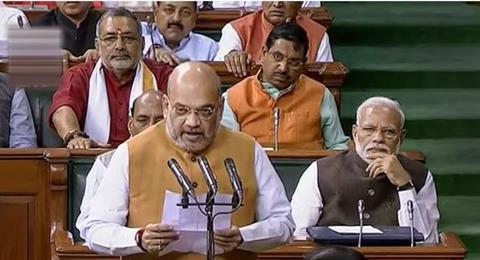PM and HM Laud Supreme Court’s Historic Ruling as a Turning Point for Jammu & Kashmir
The Supreme Court's decision to repeal Article 370 in Jammu and Kashmir is a significant legal achievement and a turning point in India's socio-political history.
In a landmark decision, the Supreme Court of India upheld the government’s move to abrogate Article 370 from Jammu and Kashmir. This move had previously altered the region’s autonomy and integration with the rest of India. This ruling not only marks a significant legal juncture but also sparks a wide array of reactions and implications, both politically and socially, within the nation and beyond.
370 from Jammu and Kashmir. This move had previously altered the region’s autonomy and integration with the rest of India. This ruling not only marks a significant legal juncture but also sparks a wide array of reactions and implications, both politically and socially, within the nation and beyond.
The abrogation of Article 370 by the Parliament of India on August 5, 2019, led by Prime Minister Narendra Modi, had been one of the most contentious decisions in recent Indian history. It revoked the special status granted to the state of Jammu and Kashmir, bringing it under the same legal framework as other Indian states. This move, while celebrated by some as a step towards national integration, was viewed by others as a breach of trust and an undermining of the region’s autonomy.
Union Home Minister Shri Amit Shah, expressing his satisfaction over the Supreme Court’s verdict, emphasized the positive changes that followed the abrogation. According to Shah, the decision paved the way for peace, normalcy, and development in a region once marred by violence. He highlighted the growth in sectors like tourism and agriculture, raising the income levels in Jammu, Kashmir, and Ladakh. Furthermore, Shah pointed out that the verdict affirmed the constitutional validity of the decision, reinforcing the government’s stance.
Prime Minister Narendra Modi echoed similar sentiments, terming the Supreme Court’s decision as historic and reaffirming the parliamentary decision. He underscored the essence of unity and the promise of a brighter future for the people of Jammu, Kashmir, and Ladakh. Modi’s message focused on hope, progress, and the commitment to fulfilling the dreams of the region’s residents, particularly the marginalized sections who, according to him, suffered due to the erstwhile Article 370.
However, the Supreme Court’s ruling extends beyond legal and constitutional dimensions. It holds profound political implications, especially for the ruling party and the opposition. For the ruling Bharatiya Janata Party (BJP), the verdict validates their political agenda and governance approach. It bolsters the party’s narrative of strong, decisive leadership and commitment to national integration. On the other hand, opposition parties, which have been critical of the move, might find themselves in a challenging position, balancing their critique of the decision while respecting the apex court’s judgment.
Socially and regionally, the decision’s impact is manifold. For residents of Jammu, Kashmir, and Ladakh, the verdict might bring mixed feelings. While some may view it as a step towards greater development and integration with the rest of India, others might perceive it as a loss of their unique identity and autonomy. The assurance of development and peace, as promised by the central government, will be closely watched by the residents and the international community.
The international perspective on this ruling is also noteworthy. India’s decision to abrogate Article 370 has drawn global attention, with varied responses from different nations and international bodies. The Supreme Court’s endorsement of this decision could influence international perception and diplomatic relations, particularly with neighbouring countries and those with a significant interest in the region.
In conclusion, the Supreme Court’s upholding of the abrogation of Article 370 is a multifaceted development with wide-ranging implications. It’s a moment of legal, political, and social significance, marking a new chapter in the history of Jammu and Kashmir. The long-term impact of this decision, both within the region and in the broader national and international context, will unfold in the years to come.
Today’s Supreme Court judgment upholding the abrogation of Article 370 in Jammu and Kashmir is not just a legal milestone but a transformative moment in India’s socio-political landscape. It symbolizes a pivotal shift in the region’s constitutional status and sets a precedent for national integration policies. By affirming the government’s decision, the ruling may catalyze development and peace in the region, as promised by the central leadership. However, it also raises significant questions about regional autonomy and the preservation of local identities. The judgment’s long-term impact on the region’s socio-economic fabric, its people’s aspirations, and India’s national unity will be observed closely as it is poised to shape the future discourse of federal relations and human rights in India.
